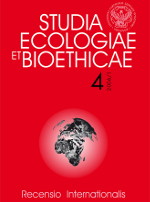Aksjologiczne podstawy integralnej ochrony środowiska przyrodniczego i ludzkiego
Axiological principles of integrated protection of human and natural environments
Author(s): Wojciech BołozSubject(s): Ethics / Practical Philosophy, Human Ecology
Published by: Wydawnictwo Naukowe Uniwersytetu Kardynała Stefana Wyszyńskiego w Warszawie
Keywords: ecological crisis;anthropocentrism;biocentrism;Christianity;moderate anthropocenrics;human rights;human dignity;
Summary/Abstract: Over the last few decades, we have witnessed a significant change in human mentality and attitudes towards the natural environment and its protection. This change is accompanied by different axiological principles within which we can distinguish: 1) the anthropocentric concept which places man in the centre and grants him a privileged place amongst other species; 2) the anti-anthropocentric concept which stresses the equality of all species and demands a reversal in humanistic orientation consolidated by the European Enlightenment; 3) the moderate anthropocentric concept which underlines human’s caring and a responsible role towards the ecosystem. As disturbances of ecological balance are the result of human actions and the sign of the cultural crisis, the necessity to protect the natural environment should be realised. John Paul II was a supporter of the above. He referred to the integrated ecology, which combines the protection of the natural environment with the concern of the quality of human spirituality. Integrated ecology poses two demands: 1) all actions towards environmental protection should be understood as means of confirming the respect of human personal dignity; 2) those actions which harm the natural environment and threaten man should be given up.
Journal: Studia Ecologiae et Bioethicae
- Issue Year: 4/2006
- Issue No: 1
- Page Range: 113-120
- Page Count: 8
- Language: Polish

